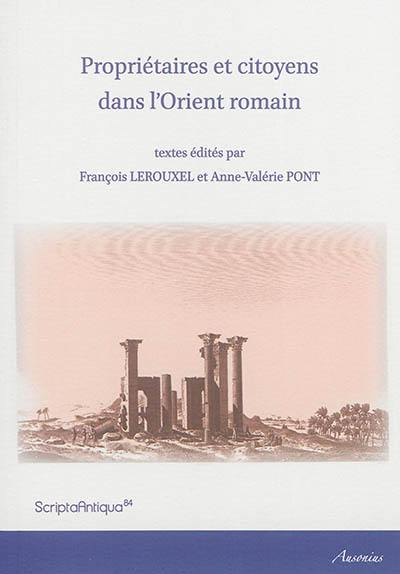
Fiche technique
Format : Broché
Nb de pages : 364 pages
Poids : 720 g
Dimensions : 17cm X 24cm
ISBN : 978-2-35613-152-2
EAN : 9782356131522
Propriétaires et citoyens dans l'Orient romain
Quatrième de couverture
Propriétaires et citoyens dans l'Orient romain
Ce livre rassemble quinze contributions mettant en parallèle l'histoire institutionnelle et l'histoire économique de l'Orient romain, depuis la fin de l'époque hellénistique jusqu'à l'Antiquité tardive et même au-delà. En s'interrogeant sur le rapport entre propriété foncière et fonctionnement des cités, à travers l'examen de corpus de sources de nature et d'origine variées, notamment papyrologiques et épigraphiques, il observe les changements touchant ces domaines à l'époque romaine et leurs liens, souvent laissés dans l'ombre. Les conditions économiques, fiscales et juridiques propres à l'empire romain eurent ainsi un impact local dans les relations entretenues par les cités avec les propriétaires sur leur territoire. La conclusion de l'ouvrage fait ressortir une idée essentielle : du point de vue même du pouvoir impérial, l'inégalité foncière entre propriétaires au sein du territoire civique était nécessaire au financement de la vie civique, pour que les notables puissent assumer magistratures et liturgies. Dans le même temps, elle modifie progressivement les équilibres sociaux et politiques à l'intérieur des cités et apparaît comme un facteur majeur d'évolution de ces dernières.
This collection brings together a series of papers combining institutional and economic history of the Roman East, from the end of the Hellenistic period to Late Antiquity and beyond. By studying the relationship between landownership and the workings of cities, using different kinds of evidence, mainly epigraphical and papyrological documents, they focus on changes in those fields and on the links, often overlooked, they intertwined during the Roman period. The economic, fiscal and legal regime of the Roman Empire had a local impact on the relationship between cities and landowners located on their territories. From these essays emerges a crucial idea : from the point of view of the imperial rule itself, inequality of land distribution between landowners on civic territories was necessary to civic life so that elite members might take charge of the expenditure of magistracies and liturgies. In the meantime, it gradually altered the social and political equilibrium of the cities and significantly contributed to their historical evolution.





